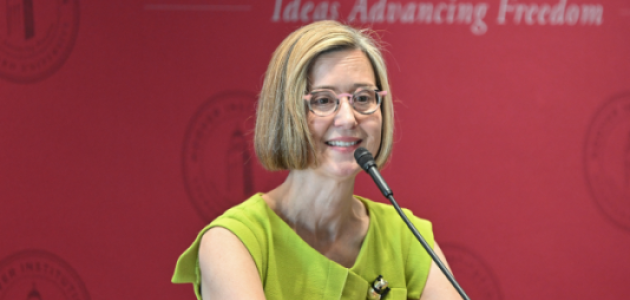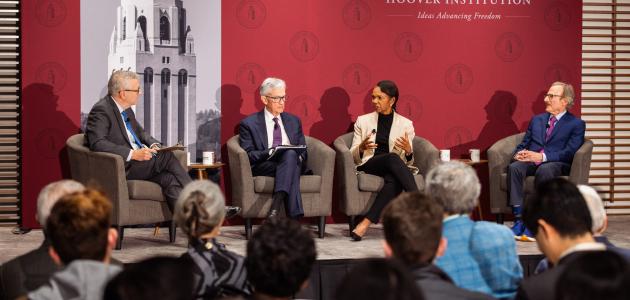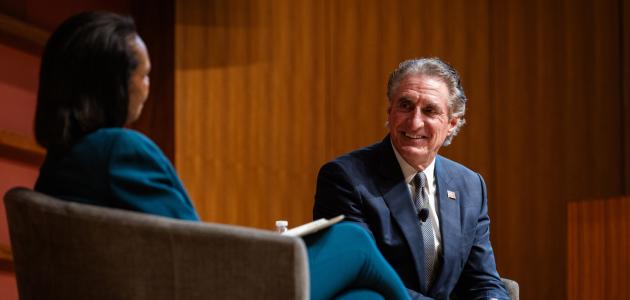A weekly digest of the latest news and research related to the work of the Technology, Economics, and Governance Working Group. Topics covered in the digest include cybersecurity, domestic regulation, innovation, international competition, social media disinformation, and the California exodus.
This week’s roundup covers Secretary Austin’s remarks in Ukraine, Germany’s position on an EU oil embargo, Beijing’s economic measures to mitigate the effects of COVID shutdowns, NATO’s affirmation of a cyber Article 5 response, and increasing cyber attacks against Russia. Additionally, two US representatives call for greater GPS modernization, NGA takes over Project Maven, CA energy subsidies may be increasing consumption instead of efficiency, Elon Musk frustrates Big Tech regulators, and shadowbanning is decreasing social media users’ trust.
Industrial Policy, International Competition, and Cooperation
Behind Austin’s Call for a ‘Weakened’ Russia, Hints of a Shift | The New York Times
On Monday in Ukraine, Defense Secretary Austin announced that the US aims to weaken Russia enough to prevent them from mounting a similar invasion in the future. The Secretary’s remarks differ from the Biden Administration’s initial hesitancy to frame the war as a confrontation between Washington and Moscow. While pro-Russia narratives may use Mr. Austin’s statements as evidence that America’s primary aim is to destabilize Putin’s regime, officials say the Secretary’s speech is part of a wider strategy to boost morale as the conflict moves to Ukraine’s Russian-speaking south and east. However, some experts worry that escalating rhetoric could push Putin to resort to nuclear or chemical weapons on the battlefield to demonstrate Russia’s strength.
China's Xi calls for 'all-out' infrastructure splurge to rescue economy | CNN
As strict lockdowns continue to stifle China’s economy, President Xi plans to splurge on a new infrastructure initiative designed to revive domestic demand and protect growth rates. Transportation, energy conservation, cloud computing, and AI are several of the investment areas Xi hopes to target, although the President did not specify the expected cost of his strategy. Beijing’s zero-Covid approach has imposed heavy costs on business, and current shutdowns in Shanghai have led to global supply chain disruptions. The Chinese currency recently reached its lowest level in over a year, and local stocks have plunged as speculators fear that rising case counts will lead to further economic consequences.
Germany Drops Opposition to Embargo on Russian Oil | The Wall Street Journal
According to government officials, Berlin will no longer oppose a European Union embargo on Russian oil imports so long as Germany is allotted enough time to transition to alternative sources. Germany’s refusal to support EU sanctions on oil-and-gas trade with Russia was a significant barrier to implementing a union-wide boycott, and Berlin’s change of heart has made a phased-in embargo agreement more likely. However, an oil ban requires the consent of all 27 EU governments, and worries about the economic impact of this policy remain prevalent in Hungary, Italy, Austria, and Greece. Germany’s policy change was catalyzed by a recent deal with Poland that will facilitate German oil imports through the Baltic Sea port of Gdansk.
Domestic Regulation
Biden’s tech agenda gets a reality check as Elon Musk buys Twitter | The Washington Post
Despite the Biden administration’s promises to hold Big Tech accountable and diffuse the power of America’s most powerful companies, Washington can do little to mitigate the consequences of Elon Musk’s takeover of Twitter. While critics have raised concerns about one billionaire exercising outsized sway over complicated ethical decisions governing content on one of the largest social media platforms, there are no obvious antitrust conflicts with the deal. Additionally, Musk’s intention to take the company private means that his ownership of the platform would not be scrutinized as closely by government agencies. Bipartisan agreement on other tech regulation initiatives has not extended to the Twitter controversy, as Democrats and Republicans remain fiercely divided on Musk’s apparent goal of expanding freedom of speech on the platform.
Innovation
The US military needs a modernized GPS capability to maintain superiority | Defense News
Representatives Don Bacon, R-Neb., and Mikie Sherril, D-N.J., argue that the US military must modernize the GPS satellite constellation to retain its technological advantages amid increasing international competition. They argue that China’s BeiDou system poses a significant threat to American influence, particularly since Beijing intends to utilize its satellites as part of the Belt and Road initiative by subsidizing the adoption of its infrastructure throughout its region. To keep up with competitors and mitigate modern threats, updated GPS satellites must feature improved security capabilities and increased resilience to cyberattacks; damage to the GPS network could have a devastating impact on critical infrastructure.
Intelligence agency takes over Project Maven, the Pentagon’s signature AI scheme | C4ISRNET
On Monday, the National Geospatial-Intelligence Agency (NGA) announced that it would assume responsibility over Project Maven—a major part of the Pentagon’s artificial intelligence program. AI systems developed by Project Maven are designed to process visual input from drones and automatically detect potential targets. While NGA always played a key role in Project Maven’s development, the initiative was initially managed by the Office of the Under Secretary of Defense for Intelligence and Security. Giving NGA leadership over the project will allow the agency to better integrate its advanced data infrastructure and intelligence expertise.
Cyber
Opinion: NATO’s Credibility Is on the Line with its Cyber Defense Pledge. That’s a Bad Idea. | Politico
In 2014, NATO confirmed that its Article 5 collective defense pledge applies to cyber threats. After Russia’s invasion of Ukraine, NATO Secretary Stoltenberg reaffirmed the alliance’s commitment to a unified retaliation in the case of a cyberattack on one of its members. However, the details about which cyber threats would prompt an Article 5 response remain dangerously ambiguous. NATO should lay out detailed criteria about its cyber thresholds while clarifying that minor cyber attacks are the responsibility of individual states. NATO’s current policy of strategic ambiguity is understandable given the difficulties associated with cyber attribution, but putting off defining an Article 5 threshold risks a lengthy deliberation in the midst of a future crisis.
Russia Is Being Hacked at an Unprecedented Scale | Wired
Russia’s status as a nation that exports cyberattacks but is rarely a victim changed dramatically after its invasion of Ukraine. Both international hacktivists and Ukrainian forces continue to target Russia and its businesses with DDoS attacks and malware tailored for Moscow’s systems. At the forefront of the cyberwar is Ukraine’s “IT Army”—a volunteer group of hackers that has been conducting attacks against Russia and coordinating wider efforts by publishing its lists of targets online daily. Most of the attacks introduce inconveniences that are unlikely to make a difference on the battlefield; however, some experts hypothesize that cyber pressure may push Moscow to attempt to develop a sovereign internet.
California
Most California incentive programs meant to reduce energy use have the opposite effect | UCLA Newsroom
Despite California’s large subsidies for energy-efficient appliances, the results of one study indicate that these investments actually increase net energy consumption. While some programs led to energy savings, most subsidies appeared to lead users to overcompensate for efficiency gains by increasing usage. The energy-saving programs were also reportedly concentrated in wealthier neighborhoods, while lower-income residents who typically live in less efficient housing were underrepresented.
Freedom of Speech, Domestic Democracy, and Extremism
Shadowbanning Is Big Tech’s Big Problem | The Atlantic
Shadowbanning—removing or reducing the visibility of a user’s content without telling them—has become controversial as social media platforms continue to sacrifice transparency for increased content control. Shadowbanning can be an effective tool for silencing harmful users, but companies’ tendencies to deny the existence of shadowbanning outright combined with the already-opaque nature of content algorithms have eroded trust. Users are often left wondering whether secret censorship is to blame for underperforming posts.














